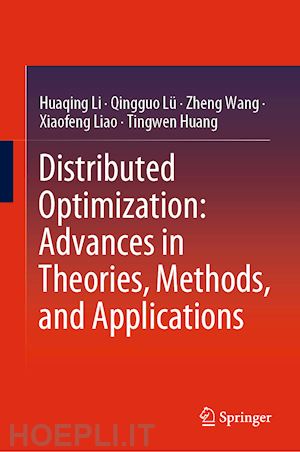
Questo prodotto usufruisce delle SPEDIZIONI GRATIS
selezionando l'opzione Corriere Veloce in fase di ordine.
Pagabile anche con Carta della cultura giovani e del merito, 18App Bonus Cultura e Carta del Docente
This book offers a valuable reference guide for researchers in distributed optimization and for senior undergraduate and graduate students alike.
Focusing on the natures and functions of agents, communication networks and algorithms in the context of distributed optimization for networked control systems, this book introduces readers to the background of distributed optimization; recent developments in distributed algorithms for various types of underlying communication networks; the implementation of computation-efficient and communication-efficient strategies in the execution of distributed algorithms; and the frameworks of convergence analysis and performance evaluation. On this basis, the book then thoroughly studies 1) distributed constrained optimization and the random sleep scheme, from an agent perspective; 2) asynchronous broadcast-based algorithms, event-triggered communication, quantized communication, unbalanced directed networks, and time-varying networks, froma communication network perspective; and 3) accelerated algorithms and stochastic gradient algorithms, from an algorithm perspective. Finally, the applications of distributed optimization in large-scale statistical learning, wireless sensor networks, and for optimal energy management in smart grids are discussed.
Huaqing Li, Professor, College of Electronic and Information Engineering, Southwest University, Chongqing, China.
He received the B.S. degree in Information and Computing Science from Chongqing University of Posts and Telecommunications, in 2009, and the Ph.D. degree in Computer Science and Technology from Chongqing University in 2013. He was a Postdoctoral Researcher at the School of Electrical and Information Engineering, The University of Sydney from September 2014 to September 2015, and at the School of Electrical and Electronic Engineering, Nanyang Technological University from November 2015 to November 2016. From July 2018, he was a Professor at the College of Electronic and Information Engineering, Southwest University, Chongqing, China. His main research interests include nonlinear dynamics and control, multi-agent systems, and distributed optimization. Prof. Li currently serves as a Regional Editor for Neural Computing & Applications and an Editorial Board Member forIEEE Access.
Qingguo Lü, College of Electronic and Information Engineering, Southwest University, Chongqing, China.
He received the B.S. degree in Measurement and Control Technology and Equipment from the Anhui University of Technology, Anhui, China, in 2014, and the M.S. degree in Signal and Information Processing from Southwest University, Chongqing, China, in 2018, where he is currently pursuing the Ph.D. degree in Computational Intelligence and Information Processing. His research interests include privacy protection of networked systems, distributed optimization, neurodynamic, and smart grids.
Zheng Wang, College of Electronic and Information Engineering, Southwest University, Chongqing, China.
He received the B.E. degree in Electronic Information Science and Technology from the University of Jinan, Jinan, China, in 2015, and the M.E. degree in Electronics and Communication Engineering from Southwest University, Chongqing, China, in 2018. His research interests include multi-agent systems and distributed optimization.
Xiaofeng Liao, Professor, School of Computer Science, Chongqing University, Chongqing, China.
He received the B.S. and M.S. degrees in Mathematics from Sichuan University, Chengdu, China, in 1986 and 1992, respectively, and the Ph.D. degree in Circuits and Systems from the University of Electronic Science and Technology of China, Chengdu, in 1997. From 1999 to 2012, he was a Professor with Chongqing University, Chongqing, China. From January 2013 to November 2018, he was a Professor and the Dean of the College of Electronic and Information Engineering, Southwest University, Chongqing. He is currently a Professor and the Dean of the College of Computer Science, Chongqing University. He is also a Yangtze River Scholar of the Ministry of Education of China, Beijing, China. From 1997 to 1998, he was a Research Associate with the Chinese University of Hong Kong, Hong Kong. From 1999to 2000, he was a Research Associate with the City University of Hong Kong, Hong Kong. From 2001 and 2002, he was a Senior Research Associate with the City University of Hong Kong. From 2006 to 2007, he was a Research Fellow with the City University of Hong Kong. He holds 5 patents and published 4 books and over 300 international journal and conference papers. His current research interests include neural networks, nonlinear dynamical systems, bifurcation and chaos, and cryptography. Prof. Liao currently serves as an Associate Editor for IEEE Transactions on Cybernetics and IEEE Transactions on Neural Networks and Learning Systems.
Tingwen Huang, Professor, Science Program, Texas A&M University at Qatar, Doha, Qatar.
He received B.S. degree in Mathematics from Southwest University, Chongqing, China, in 1990, the M.S. degree in Mathematics from Sichuan University, Chengdu, China, in 1993, and the Ph.D. degree in Mathematics from Texas A&M University, College Station, TX, USA, in 2002. He is currently a Professor with Texas A&M University at Qatar, Doha, Qatar. He has expertise in chaotic dynamical systems, neural networks, optimization and control, and traveling wave phenomena. Prof. Huang currently serves as an editorial board member for three international journals, such as IEEE Transactions on Cybernetics, IEEE Transactions on Neural Networks and Learning Systems, Cognitive Computation, and Advances in Artificial Neural Systems.











Il sito utilizza cookie ed altri strumenti di tracciamento che raccolgono informazioni dal dispositivo dell’utente. Oltre ai cookie tecnici ed analitici aggregati, strettamente necessari per il funzionamento di questo sito web, previo consenso dell’utente possono essere installati cookie di profilazione e marketing e cookie dei social media. Cliccando su “Accetto tutti i cookie” saranno attivate tutte le categorie di cookie. Per accettare solo deterninate categorie di cookie, cliccare invece su “Impostazioni cookie”. Chiudendo il banner o continuando a navigare saranno installati solo cookie tecnici. Per maggiori dettagli, consultare la Cookie Policy.